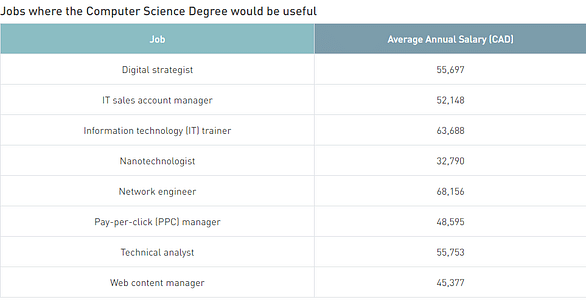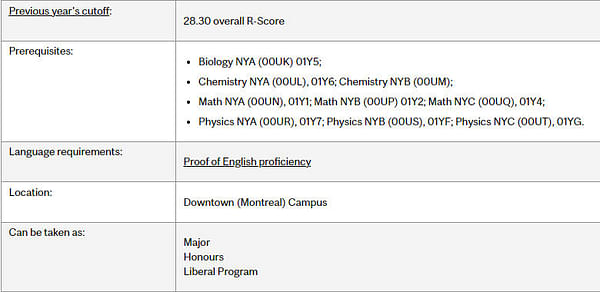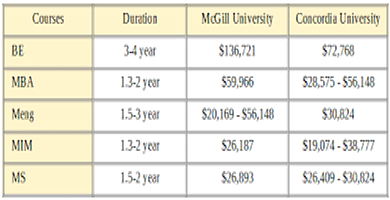Get Answers on Test Preparation, Admissions & Campus Life
Study Abroad Countries
In what ways can McGill University surpass the reputation of the University of Toronto??
Both McGill University and the University of Toronto are widely reputed. If you have to choose between these, make a choice based on the subject and the department you are interested in.
Don’t put too much emphasis on the university rankings. It changes each year. Here is a brief comparison of the two. Currently, McGill University world ranking is #44 (THE World University Ranking). While University of Toronto is ranked #18 by THE World University Ranking.
Here is a brief comparison of these two.
| Parameters | McGill University | University of Toronto |
| Tuition fees (undergraduate) | 29,200 CAD (International students) | 45,690 CAD (International students) |
| Acceptance rate | 48.9% | 43% |
| Popular courses | Medical and Health Science, Computer Science, Social Science & Humanities | Psychology, Medical Technology, Automation and Control, Human and Biological Sciences |
| Average salary | CAD 62k | CAD 68k |
You can’t go wrong with either of these schools.
What is it like to be a graduate student in computer science at McGill University??
McGill University is an amazing place, specially as an international graduate. From its comparatively affordable fees to the amazing education and environment experience, it gives you one of the best experience out there.
Situated in Montreal, McGill University is pretty organized and renowned among international students. It ranked #1 in Canada among clinical doctoral institutes for 15 continuous years by Maclean's University, and #35th as per QS News World University 2020 Ranking. It has 400+ courses through its many research environments and frameworks, thus popular among graduate students.

The University has a general score of 58.5% in computer science engineering according to usnews.com. Computer Science at McGill University is a great choice due to its rankings and placements. Here are some factors that make it a great experience:
- Placements: Microsoft being the major player in university recruitment, there are numerous good placement opportunities at McGill when compared to other similar universities in Canada.
- Location: Montreal is (economical) than Toronto or Vancouver, a $200 is sufficient to make you go (barring the lease) If you're an international student, at that point McGill is a promising alternative.
- Diversity: Approximately 30% of the University students are international students, which means a lot of instant friends!
- Campus Life: Free food, free tutorials on topics such as how to write your thesis, Artificial Intelligence & Machine Learning in Python are among the other programs. For students, the swimming pool at the McGill gym is accessible. Athletics, gymnastics, dancing, etc are among the amazing activities that McGill has to offer with a designated fee for the same.
In short, McGill is a good option for international graduate students gearing up for their careers in Computer science. The University reported 6,318 undergraduate students and 2,387 graduate students for fall 2019, with an acceptance rate of about 41 percent, the career opportunities for a graduate student from computer science at McGill University are abundant.
Should I go to Mcgill University (finance) or Concordia University (finance)??
Both McGill University and Concordia Universities are known for their top-notch finance programs. One of my friends shared his experience at his finance-related job. He told me that he was hired just because the other candidate was a graduate of JMSB.
Concordia gives you more hands-on experience because even undergrad students manage multimillion-dollar portfolios, while McGill has more brand value. This may give you an edge in international prospects especially in the U.S. since most Americans don't really know too much about schools outside of their country.
I know many companies in Montréal that specifically ask for JMSB and HEC students, but I have never heard much about McGill's finance program. So, from the limited information I have, lJMSB has a great co-op program and hands-on experience while McGill is typically more ideology and theory focused, based on its recognition.
Ultimately, the decision of which school to attend will depend on your personal preferences and priorities. It’s crucial to go for the school that best aligns with your career goals and personal needs.
What are the job prospects after graduating from McGill University as an international student?
The job prospects after graduating from McGill University are good. You can leverage the huge alumni base to seek out job opportunities. It’s easier to get in contact with the alumni and the current students from the university regarding any career opportunities.
According to the average salary trends, McGill University MBA graduates are the best paid. Here are the degree-wise salary highlights.
| Degree | Average Salary |
| MBA | $ 111,000 |
| LLM | $104,000 |
| Master in Science | $93,000 |
| Bachelor(Other) | $74,000 |
| Bachelor of Science | $70,000 |
| Master of Arts | $72,000 |
Most graduates from McGill starts working in Vancouver, Toronto, Montreal, or in the U.S. There are major startups and MNCs.
What is your review of McGill University?
McGill University is undoubtedly a good place with world-class facility. It is one of the leading universities in North America. It is very competitive and has a broad student support system. The University admits students from all over the globe so you won’t feel out of place here. There were various nationalities and many students communicating 2-4 languages.
On average, McGill graduates earn around 40,000 CAD to 108,000 CAD and are placed within 3-6 months of completing their studies. However, the support services for students and their administration staff might not meet your standards. Also, the atmosphere here can be a bit too intense because of their reputation and constant efforts to maintain their standing.
Admission wise, being one of Canada's highest-ranking universities, the GPA and admission criteria is also very high. It has an acceptance rate of 41%, an articulate essay and strong recommendations are important. It’s located in Montreal which is a splendid city with great restaurants, nightclubs, and world-class museums a stone's throw from it.
McGill is an excellent place providing lots of courses, financial help, facilities, and a good support system. There’s a wide variety of highly skilled faculty for pharmacy, psychology, healthcare, the business sector, sciences, education, engineering, music, arts, law, environmental and agriculture, computer sciences and many more.
The dorms are located near the hill and the lake, suitable for comfort in the autumn and spring and for skating and hot chocolate in the winter. Some of the sleeping places are situated next to the Mond Royal, the Montreal "Central Park" featuring footpaths, cycling pads, and skiing trails. The stunning mountains are within 2 hours for climbing and skiing. Students are crucial, lessons are rigorous.
McGill University: Which accommodation is better?
Since you’re an international student from another culture altogether, staying on campus will definitely help you a lot. It is always better and convenient than off-campus locations as it’ll save you the hassles of flat hunting, interacting with totally new people.
However, vacancies in hostels are really less and you must apply for residence as soon as possible. So make sure you’ve applied for it as soon as you receive the offer letter. International students are better off staying on-campus at least for the initial period as it saves them a lot of time, effort and money spent on understanding the local areas.
- On-campus residence at McGill houses over 3,000 students in its many dorms, apartments and hotel-type styles so you’ve a lot of budgets and arrangements.
- This housing includes a mandatory meal plan costing 5,475 CAD/year.
- There are also shared kitchens to help students meet their diverse needs and dietary requirements
- University housing charge ranges from 8,148 to 13,052 CAD annually
Off-Campus Residence
If you fail to get housed or choose to go for off-campus housing, it has its own perks too.
Foreign students can go for The Buddy Program where you can find a "Buddy" who helps you find a place outside the campus. This is a safe and handy facility offered by McGill itself.
- The rent and options in Saint Anne are economical with multiple facilities.
- Public transport is great and easy to use.
- Rent usually costs 500 to 1,300 CAD per month with meal plans ranging from 2,600 CAD to 4,000 CAD annually.
The whole area of Saint-Anne de Bellevue is beautiful, small, quiet and comfortable which is littered with nice restaurants and has reasonable rentals. The lakefront is a major attraction for weekends. Foreign students can explore these options if they want to avoid the hostel limitations or other issues.
What is it like to study physics at McGill University?
The subject is very challenging and will definitely push you to do better. Your problem-solving abilities will improve while you pursue this problem, sometimes requiring endless hours of deep thinking. In final year you will find all this helpful, especially when you pick up advanced subjects.
Homework and classes will take up most of your time and during exams, a crib sheet will be provided to you to solve problems that you have never heard of before. This is to give you a better foundation in all the major fields of your subject and might even cause a burnout. Still, with proper breaks and consistency you will definitely find it rewarding.

Learning Physics at McGill University is for the development of problem-solving skills. With intense activities and deep thought, you’d be engrossed in and cultivated by the subject. Faculties actively look for (talented/interested) students looking for research and internships.
What is (approx) per semester fees for McGill and Concordia University?
Both universities are considered great and Canada, hence its a given that they will incur good costs. Different programs will have different fees and additional costs. If you are an international student, your fee will be significantly higher as well.
McGill University range is quite wide from $13,830 to $136,721 for some professional degrees whereas the Concordia University range is from $11,299 to $72,768.
Keep in mind the living costs as well, as tuition only refers to the program cost. Fees differ from courses to courses so here are some particulars of both the universities of some courses:

Additional expenses also include the application fees, for McGill University it can range from $85.37 - $89.87 and $77.14 – $772.12 for Concordia University.
On-campus living expenses at McGill University range from $13,623 - $18,527 and for off-campus may be anywhere from $8,600 - $20,100. Living expenses of Concordia University range from $26,755.57- $28,136.56.
What are my chances of getting into McGill University??
The acceptance rate of McGill University is 33.6 %. The acceptance rate naturally varies based on the program. Popular departments naturally have a lower acceptance rate. You need to have stellar grades to secure admission at McGill. The average selection grade is around 96%. So, it’s very competitive to apply.
In terms of everything, which one should I choose: McGill University or University of Hong Kong?
Both McGill University and University of Hong Kong are reputed global universities. So, a choice between these two universities depends on your requirements.
- McGill University world ranking - 27 according to CWUR.
- University of Hong Kong world ranking - 30 according to Times Higher Education Rankings 2022.
Here are some of the other parameters that will help you compare these two universities.
| Factors | McGill University | Hong Kong University |
| Reputed Courses | Mineral & Mining Engineering, Library & Information Management, Anatomy & Physiology, Linguistics Geography | Dentistry, Education, Civil & Structural Engineering, Architecture, Business and Management |
| Tuition Fees | $24,800 - $63,286 per annum | $18,850 per annum (non-local students) |
| Living cost | $1,21,830 per year | $5,850 for 10-12 months |
| Placements | $13,398 - $58,718 per year | $43,611 per year |
Hong Kong and Montreal are exciting cities to live. If you are from Canada, living in Hong kong will help you expand your horizon. You will get the chance to explore the Asian economy. The reverse is true for students living in Asia. Choosing McGill will give you the option to have a career in Canada and US.
While choosing one of these, keep in mind the licensing requirement as well. For courses in law, medicine, etc. where you choose to study will dictate where you work.

